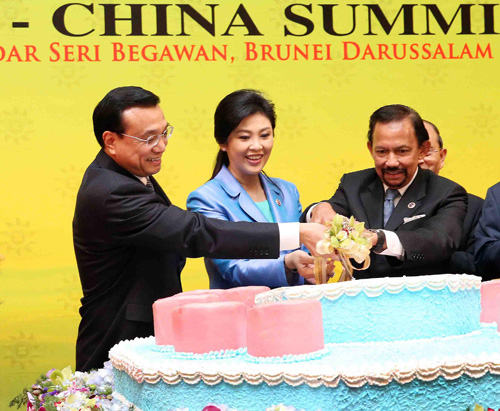|
 |
|
CELEBRATION: Chinese Premier Li Keqiang (left), Brunei Sultan Hassanal Bolkiah (right) and Thai Prime Minister Yingluck Shinawatra attend a ceremony to mark the 10th anniversary of China-ASEAN strategic partnership in Bandar Seri Begawan, Brunei, on October 9 (LIU WEIBING) |
Though President Xi Jinping's trip to Southeast Asia that included the APEC meeting and Premier Li Keqiang's presence at the Association of Southeast Asian Nations (ASEAN) Summit were among the scheduled visits for China's two top leaders, their frequent meeting with Southeast Asian nation leaders highlights the importance the new Chinese leadership attaches to the region and reflects China's diplomatic strategy of shaping a mutually beneficial and win-win relationship with the country's neighbors.
In the half year since the inauguration of China's new leadership in March, Xi and Li have on various occasions met with state leaders from nine of the10 ASEAN nations more than 20 times, a high rate of frequency rarely seen between China and countries from other regions.
A closer neighborhood
Su Hao, a professor of international studies with Beijing-based China Foreign Affairs University, said Southeast Asia is one of the most important areas of China's diplomacy with neighboring countries.
"China needs to sustain a stable surrounding environment and consolidate the relationship with its neighbors if it wants to play a greater role in the world arena. Southeast Asia takes a crucial position for China in terms of building a peaceful and stable neighborly environment, as the region is a strategic channel for China from both land and sea," said the professor.
China and Southeast Asian countries have long been cooperation partners in the economy, culture and politics. For decades, China has been committed to developing good-neighborly relations and partnerships with neighboring countries, cementing peaceful relations with Southeast Asian nations by fostering goodwill.
Su held China and ASEAN are to a certain degree an integrated economy with production and marketing closely linked with each other. The developments of the two rely heavily on each other.
Since 2003, China and ASEAN have established the strategic partnership for peace and prosperity, leading to a "golden decade" of cooperation over the past decade. By advancing practical cooperation, China and ASEAN have set up the world's largest free trade area among developing countries. China is now ASEAN's biggest trading partner and ASEAN China's third largest trading partner. In 2012, two-way trade exceeded $400 billion, five times that of 10 years ago; mutual investment totaled over $100 billion, three times that of 2003.
As ASEAN aims to become an economically integrated, politically cohesive and socially responsible ASEAN community by 2015, participating nations need to foster a greater degree of close connections with East Asian powers including China to stimulate its economic potential, said Su.
During Xi's latest trip to Indonesia, he called for joint efforts to build a more closely-knit community of common destiny between China and ASEAN. And at the 16th China-ASEAN leaders' meeting held in Brunei on October 9, Premier Li also stressed China's good-neighbor policy with ASEAN is a long-term strategy and that Southeast Asia is the priority of China's neighboring diplomacy.
Against a backdrop in which the global economic recovery is still weak and some of the ASEAN nations are being threatened by the international financial crisis, observers say that Chinese leaders' frequent visit to Southeast Asia is conducive to building confidence for regional development and shows China's firm position of benefiting its neighbors. ASEAN nations also increasingly feel the good faith and friendliness of China.
Addressing doubts
While China and ASEAN nations have kept a close and mutually beneficial economic relationship, some members have expressed doubts about China's growing strength in light of ongoing maritime disputes between China and some ASEAN nations.
| 